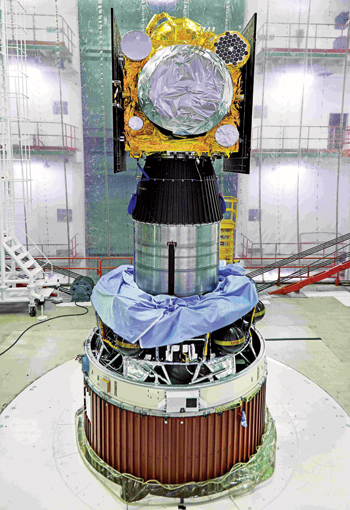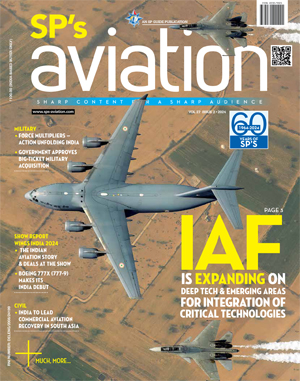INDIAN ARMED FORCES CHIEFS ON
OUR RELENTLESS AND FOCUSED PUBLISHING EFFORTS

SP Guide Publications puts forth a well compiled articulation of issues, pursuits and accomplishments of the Indian Army, over the years

I am confident that SP Guide Publications would continue to inform, inspire and influence.

My compliments to SP Guide Publications for informative and credible reportage on contemporary aerospace issues over the past six decades.
Collaboration with the Private Sector in Space
NEWS:
The Indian Space Research Organisation (ISRO) aims to undertake 60 to 70 satellite vehicle launch programmes in the next five years by private operators in order to make up the deficiency in the number of satellites, A.S. Kiran Kumar, Chairman, ISRO said. “Currently there are 42 satellites providing various services, but we need more than double that number. In the next five to six years, we envisage 60 to 70 rocket launches for our requirement. For a bigger pie in the world space market, we need bigger industry participation,” he said. ISRO seeks to set up a joint venture company with a consortium of industries. “The launch of the first PSLV on behalf of this JV is likely around 2020-21,” Kumar said. The PSLV has so far launched 209 satellites from 28 countries on commercial basis.
VIEWS:

After the nation achieved independence seven decades ago, the initial focus of the government of the day with regard to investment for rapid economic growth, was on the public sector. This was for entirely justifiable reasons as at that time, the fledgling private sector was in a nascent stage of development and neither did they have the financial capability to make large investments nor had access to the required cutting-edge technologies. The government thus took charge and through the investment of public money, created huge public sector establishments as also research and development organisations both in and outside the defence sector. On account of the massive investments of public funds involved, these institutions and agencies had to remain exclusively in the domain to the government. The Indian Space Research Organisation (ISRO) was one such entity and was solely responsible for space exploration and development of space technology. However, unlike other public sector undertakings that functioned more as departments of the central government and were afflicted with the associated maladies of poor work culture and no accountability, ISRO delivered and over the years, notched up remarkable achievements in space exploration. In the initial years, the private sector had no particular interest in the regime of space exploration as there appeared to be little or no scope for commercial activity in this area. However, there has been a profound change in the scenario making it relevant and financially attractive for the private sector to make inroads into the regime of space.
The space agency of the United States, NASA, as also of other major nations of the world, have already made much headway in exploiting the capabilities of the private sector to manufacture launch vehicles and satellites as also to send these into space utilising the launch facilities provided by state-owned agencies. NASA delegates these tasks which it regards as “mundane”, to the companies in the private sector that have developed the capability, infrastructure and competent manpower to execute these. NASA concentrates its efforts and resources largely on research and development as also on planning and guiding future projects.
Although, in India, there are already over 500 small and medium enterprises engaged in the manufacture of hardware used in space technology, Chairman of ISRO still describes the role of the private sector in space exploration so far as ‘baby steps’. However, he is also of the view that the potential for the private sector in the regime of space technology is enormous. In the past, some of the leading firms in the private sector that have contributed to the projects of ISRO, have been Avasara Technologies, Larsen and Tubro and Godrej Aerospace. However, their contribution has been limited to the supply of components. If the private sector companies have to play a significant role they need to develop the capability to deliver integrated systems and sub-systems, structures and power plants for launch vehicles, electronic control systems, satellites etc. However, to develop such capabilities, the companies involved will need considerable support from the government as also transfer of technology that is currently available not only with ISRO, but also with the space agencies of the world.
In the recent past, one of the private companies based in Bengaluru that is known by the name Alpha Design Technologies, led a consortium of companies and built the Indian Regional Navigation Satellite System (IRNSS) 1H weighing 1425 kg, to replace one of the seven satellites in the NAVIC system that is malfunctioning. NAVIC powers the nation’s Global Positioning System (GPS). Working under the supervision of a team of 70 scientists from ISRO, it took Alpha Design Technologies eight months to ready the satellite for launch that took place on August 31, 2017, on board the PSLV C 39, ISRO’s most dependable workhorse. This was the first time that a company in the private sector was involved in the assembly and testing of a spacecraft for ISRO and went beyond merely supplying components.
As per the Chairman of ISRO, while all the systems of the launch vehicle performed extremely well, unfortunately, the heat shield did not separate. As a result of this technical malfunction, the satellite remained attached to the fourth stage of the PSLV and hence could not be placed in the desired orbit. Undoubtedly, this will be seen as a setback to ISRO’s effort to galvanise the private sector. However, failure of a mission must only inspire ISRO and the private sector to confront together, the challenges ahead with grit and determination.





